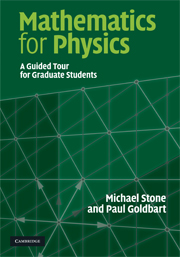Book contents
- Frontmatter
- Contents
- Preface
- Acknowledgments
- 1 Calculus of variations
- 2 Function spaces
- 3 Linear ordinary differential equations
- 4 Linear differential operators
- 5 Green functions
- 6 Partial differential equations
- 7 The mathematics of real waves
- 8 Special functions
- 9 Integral equations
- 10 Vectors and tensors
- 11 Differential calculus on manifolds
- 12 Integration on manifolds
- 13 An introduction to differential topology
- 14 Groups and group representations
- 15 Lie groups
- 16 The geometry of fibre bundles
- 17 Complex analysis
- 18 Applications of complex variables
- 19 Special functions and complex variables
- A Linear algebra review
- B Fourier series and integrals
- References
- Index
1 - Calculus of variations
Published online by Cambridge University Press: 05 June 2012
- Frontmatter
- Contents
- Preface
- Acknowledgments
- 1 Calculus of variations
- 2 Function spaces
- 3 Linear ordinary differential equations
- 4 Linear differential operators
- 5 Green functions
- 6 Partial differential equations
- 7 The mathematics of real waves
- 8 Special functions
- 9 Integral equations
- 10 Vectors and tensors
- 11 Differential calculus on manifolds
- 12 Integration on manifolds
- 13 An introduction to differential topology
- 14 Groups and group representations
- 15 Lie groups
- 16 The geometry of fibre bundles
- 17 Complex analysis
- 18 Applications of complex variables
- 19 Special functions and complex variables
- A Linear algebra review
- B Fourier series and integrals
- References
- Index
Summary
We begin our tour of useful mathematics with what is called the calculus of variations. Many physics problems can be formulated in the language of this calculus, and once they are there are useful tools to hand. In the text and associated exercises we will meet some of the equations whose solution will occupy us for much of our journey.
What is it good for?
The classical problems that motivated the creators of the calculus of variations include:
(i) Dido's problem: In Virgil's Aeneid, Queen Dido of Carthage must find the largest area that can be enclosed by a curve (a strip of bull's hide) of fixed length.
(ii) Plateau's problem: Find the surface of minimum area for a given set of bounding curves. A soap film on a wire frame will adopt this minimal-area configuration.
(iii) Johann Bernoulli's brachistochrone: A bead slides down a curve with fixed ends. Assuming that the total energy ½ mv2 + V(x) is constant, find the curve that gives the most rapid descent.
(iv) Catenary: Find the form of a hanging heavy chain of fixed length by minimizing its potential energy.
These problems all involve finding maxima or minima, and hence equating some sort of derivative to zero. In the next section we define this derivative, and show how to compute it.
Functionals
In variational problems we are provided with an expression J[y] that “eats” whole functions y(x) and returns a single number. Such objects are called functionals to distinguish them from ordinary functions.
- Type
- Chapter
- Information
- Mathematics for PhysicsA Guided Tour for Graduate Students, pp. 1 - 49Publisher: Cambridge University PressPrint publication year: 2009



